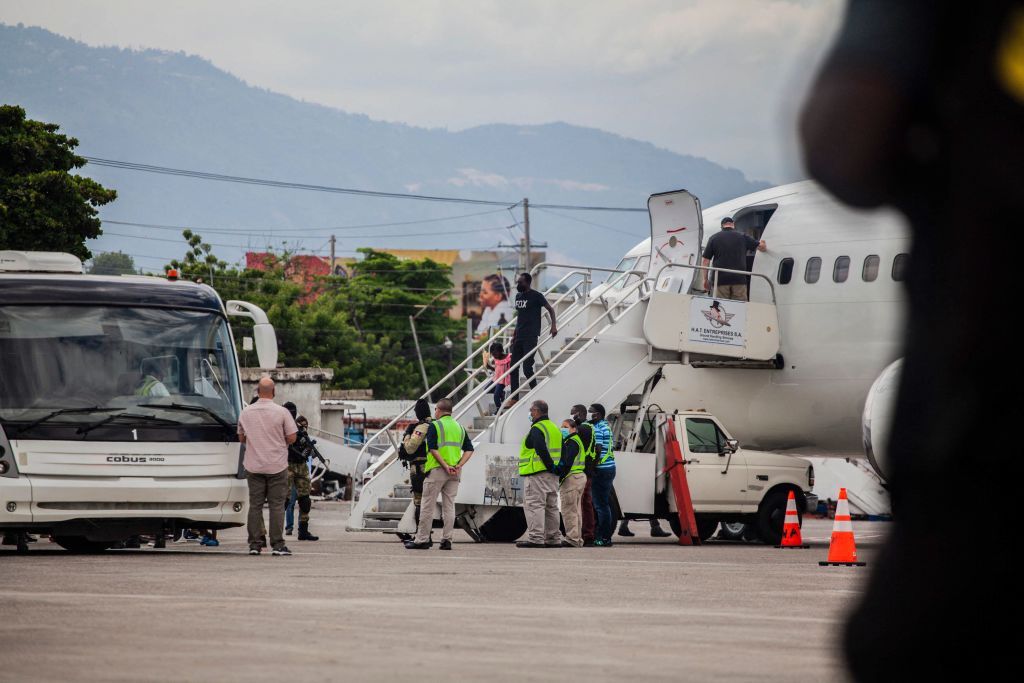Data Shows U.S. Grants Asylum To Haitians Less Than Any Other Nationality
Expelled Haitian migrants arrive from Texas at the airport in Port au Prince on September 19, 2021. | Source: RICHARD PIERRIN / Getty
Despite a seemingly neverending string of tragedies that have left its people desperate for help, data shows that the U.S. grants asylum to Haitian migrants and refugees at the lowest rate among people from any other nationality who are similarly seeking refuge.
While that fact has long been known, a new Associated Press report offered damning proof by crunching data to underscore how unwilling the U.S. has been to accept Haitians seeking refuge even as the Caribbean nation reels from devastating earthquakes, gang violence and political instability.
MORE: Dictatorship Masked As Democracy: A Timeline Of The 1915 U.S Invasion And Occupation Of Haiti
Now, after the world witnessed the brutality Haitian migrants faced from Border Patrol when trying to cross from Mexico into the U.S., American officials have unwittingly emphasized the truth behind the AP’s data with a confusing policy to expel the migrants before reversing that stance and moving to house them in a camp in Guantanamo Bay, which is notably in Cuba.
From October 2018 through June 2021, the dates with the most recent data available, the U.S. granted asylum to fewer than 5% of Haitian asylum-seekers. To be sure, that means that just 194 Haitians were granted asylum over that time period out of more than 4,200 people. That’s the lowest rate out of 84 countries.
Conversely, on the other end of the spectrum, the U.S. granted asylum over that same time period to more than 1,400 Nepalis out of nearly 2,300 applications for an acceptance rate of almost 62%, the highest of all nations.
While the data doesn’t provide any context, immigration advocates placed the blame squarely on one thing: Anti-Black racism.
US Customs and Border Protection agents guard the entrance to the Del Rio International Bridge, which is closed temporarily after an influx of migrants, at the US-Mexico border in Del Rio, Texas on September 17, 2021. | Source: PAUL RATJE / Getty
“Black immigrants live at the intersection of race and immigration and, for too long, have fallen through the cracks of red tape and legal loopholes,” Yoliswa Cele, the National Director of Narrative & Media at UndocuBlack Network, told the Associated Press. “Now through the videos capturing the abuses on Haitians at the border, the world has now seen for itself that all migrants seeking a better tomorrow aren’t treated equal when skin color is involved.”
Amara Enyia, who focuses on policy for the Movement for Black Lives, echoed Cele’s sentiment.
“A lot of times in the immigration debate, Black people are erased and Black immigrants are erased from the conversation,” Enyia said.
The U.S. and Haiti have had a complicated relationship dating back more than a century and was all but cemented after America invaded and began occupying the Black nation in 1915.
That very real history has likely helped inform past and current U.S. immigration policies, especially as it concerned Haitians and granting their refugees asylum.
Fast-forward to 2021 and the U.S. decided it was a good idea to expel — not deport, according to the semantics from White House Press Secretary Jen Psaki — Haitian migrants who had gathered in Texas seeking asylum back to their homeland, which is fresh off a devastating 7.2 magnitude earthquake that followed the assassination of Haitian President Jovenel Moïse.
This is America.
SEE ALSO:
Haitian Migrants Reportedly Freed On ‘Very Large Scale’ As U.S. Shamed Into Stopping Deportations
[ione_media_gallery id=”4185716″ overlay=”true”]

